
Courtesy of carlosforycc.com
A sophomore without a running mate, Carlos Brown Jr. ’23 argues that his unorthodox campaign for Yale College Council vice president makes him the ideal candidate for these unorthodox times.
Brown said he was scared when he declared his candidacy on Sept. 11, the formal start date of YCC campaigns. He only made his decision to run the weekend prior, after speaking with close friends and praying for guidance. Brown served as a senator this past year, meaning he lacks the experience on the YCC Executive Board which is typical of many YCC leaders. Still, he said his background makes him qualified to run for vice president, whose main role is to lead the YCC Senate.
“I really wanted to bring a very specific message about the importance of the role of vice president and the unique role of vice president, not just as kind of like a tie-on of the president, but someone whose job is to make sure the YCC is running the way it should,” Brown said. “And I felt like running that way, running as a candidate without a president, intentionally was a way to bring attention to that issue and really make sure that we’re evaluating candidates on their merits, not their associations.”
Brown said that before the campaign period, a presidential candidate — whose name he did not reveal to the News — approached him about joining a ticket. He ultimately decided to remain unpartnered, as he wanted the vice president position to be viewed as its own role, independent of the president.
Brown is now urging Yalies to “split their ticket” by voting for a president from one of the joint tickets and for him as vice president.
“I think the vice presidency needs its own attention because it’s a unique role,” Brown said. “And I ran as an independent, and giving people an option to select someone who’s not on a ticket, I think that we’re making the rest of the election more democratic, we’re encouraging people to make decisions which respond to the role.”
Brown points to various aspects of his identity as reasons he should be elected. As a sophomore, Brown says he can speak to the perspective of those who are not on campus and those who have done nearly half of their Yale career online. And as a Black man, Brown says he can share the perspective of what it is like to be Black on Yale’s campus — a perspective he says is especially necessary during this national moment of racial reckoning.
“I think it’s important to be bringing diversity to the YCC’s top leadership, diversity of thought, in a way that comes directly from differences in experience,” Brown said. “I think it makes us stronger when we have more perspectives at the table.”
Reforming the YCC Senate is Brown’s main goal. Unlike other candidates, Brown did not roll out his campaign with a long platform — instead, he initially delivered his ideas through social media graphics and Instagram story Q&A’s. He released a longer platform on Sept. 15, four days into the campaign period, that centered around YCC Senat reform and also included initiatives to support BIPOC at Yale and reform Yale’s relationship with New Haven.
When speaking to the News, Brown said the Universal Pass debate sparked his desire to reform the Senate. Brown was a leading UP advocate, and he said that the debate and accumulation of perspectives that led to the adoption of Universal Pass exemplified how the Senate should run. But he said that right now, the Senate functions as a top-down model, adopting resolutions set by the president and vice president and rarely debating and formulating ideas on its own.
If elected, Brown said he wants the first meeting of the Senate to set the priorities for the year. He wants senators to decide the plan for the year based on issues important to them. Brown credits 2018–2019 YCC President Saloni Rao ’20 with this model, as she too began her term by allowing senators and student leaders outside of the YCC to set priorities for the year.
“There are senators who are super passionate about sustainability, senators who are super passionate about racial justice, senators who are super passionate about addressing these problems that are getting very critical to our time, to right now, and they all come from different experiences,” Brown said. “I think pulling ideas from 28 people versus pulling them from two is a great way of kind of getting the year started.”
In talking to the News, Brown acknowledged that his platform does not contain as many detailed policy proposals as those of the other candidates. Still, he said this choice is intentional, allowing senators more leeway to shape YCC policy. He said he wants to “be flexible and reactive, and really respond to the needs of the moment.”
Brown talks a lot about “the moment,” saying that the public health and social justice changes demand a candidate like him. He says his vision for the YCC, of an emphasis on senators as opposed to a top-down approach, makes him qualified to help the Council adapt to the COVID-19 pandemic.
“I don’t feel like just having accomplishments is a justification to have the job,” Brown said. “I think you need to look at how people have led in times of crisis. How people have risen to the occasion. You need to look at how people interact with their communities, how they listen to people, how they end up in student groups, I think is an important factor. And so if you expand your definition beyond checking all the main boxes — experience, positions, things like that — I think you’ll see that the role of vice president is much more holistic.”
Voting for YCC elections will take place on Sept. 17 and 18.
Amelia Davidson | amelia.davidson@yale.edu







